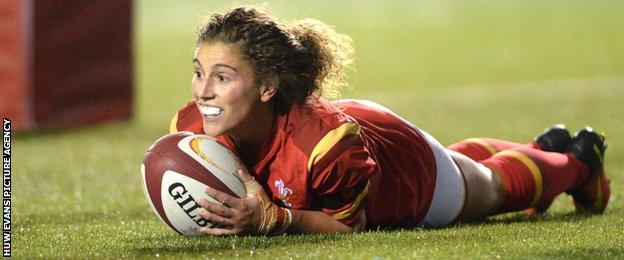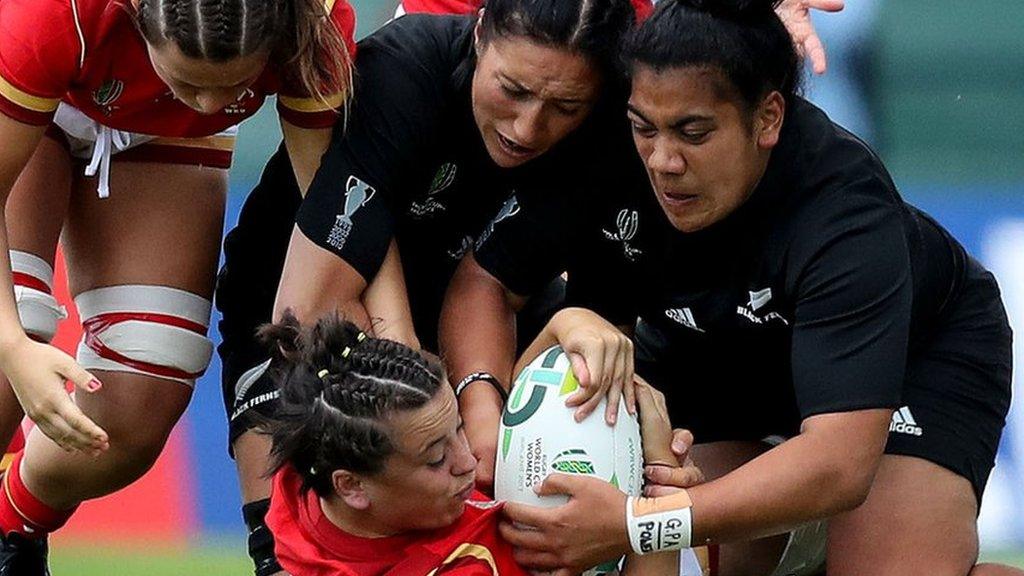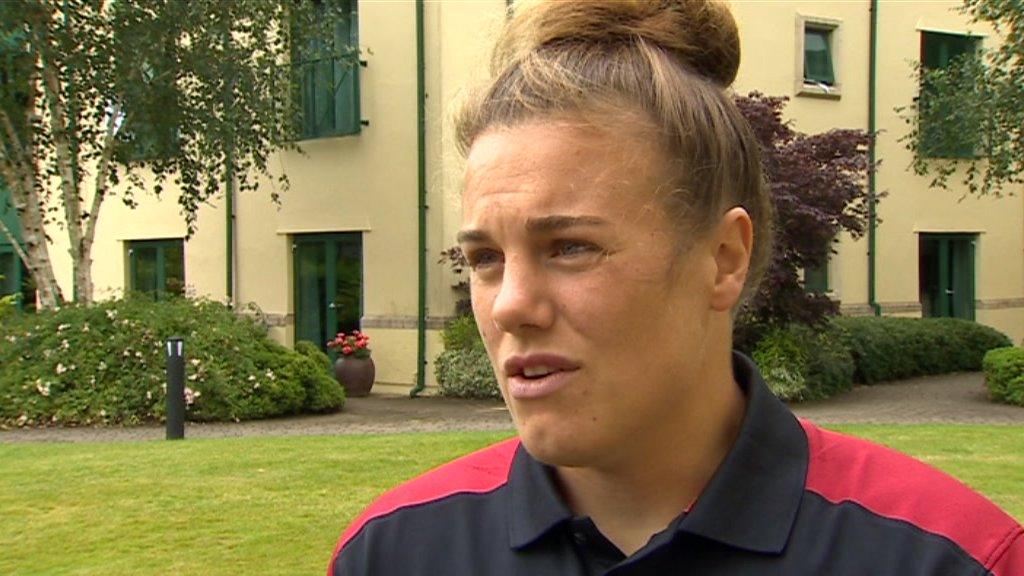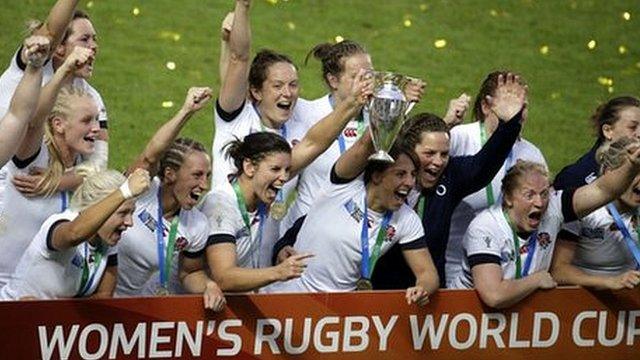Women's Rugby World Cup 2017: Wales' players put jobs on hold in Ireland
- Published

Wales' best finish at a World Cup was their fourth place in 1994
Women's Rugby World Cup |
|---|
Venues: Dublin and Belfast Dates: 9-26 August |
Coverage: Live commentary on BBC Radio 5 live sports extra, Radio Ulster medium wave and text commentary on the BBC Sport website and app. |
Gruelling training sessions. Endless interviews, increased scrutiny. The long, nervous wait to discover if you're in the squad or not. Preparing for big sporting competitions can be tough for professional athletes.
Yet for those who have to juggle their sporting careers with full-time jobs, the run-up to a tournament can be as much a logistical challenge as it is a feat of physical endurance.
The Women's Rugby World Cup starts in Ireland on Wednesday, and Wales are in the same pool as four-time champions New Zealand, previous runners-up Canada and Hong Kong.
It is a daunting draw for a team who finished eighth at the 2014 World Cup and won just one of their five Six Nations fixtures this year.
For Wales' players, however, just making the squad has been an enormous effort.
Sian Williams and Charlie Murray are the only Welsh female rugby players to have signed professional deals, but neither are in this squad.
Among the 28 making the trip to Dublin are an accountant, a teacher, a vet, one who works for a company which designs gambling machines, a farmer and a member of the army.

Jodie Evans in action for Wales against France in the 2017 Six Nations
Utility back Jodie Evans is a mental health nurse, working in the autistic and challenging behaviour unit at a hospital in Carmarthen.
Training with Wales means making several journeys a week to Cardiff, which can last an hour and a half each way.
"I'll work a morning shift to train in the afternoon or work an afternoon or evening shift to train in the morning," the 26-year-old says.
"My job is quite a lot of responsibility, so rugby is like a de-stress from work.
"It is hard to balance both but I'm lucky I've got a really supportive workforce and my manager is really understanding and has bent over backwards to make sure I can get to training.
"Sometimes you can leave the house at 6am and you won't get home until 10:30 at night. They can be long days but I've made the squad and that's the most important thing."
Clearly, the trudge from Carmarthen to Cardiff can be a tiresome one.
But the monotony of the M4 may seem merciful compared to the journey Jess Kavanagh-Williams faces from north Wales.

Wales wing Jess Kavanagh-Williams plays her regional rugby for Scarlets
The wing works as a community sport officer in Gwynedd, and has to drive to Cardiff - roughly four hours each way - up to three times a week.
"A lot of my time is spent on the A470," Kavanagh-Williams says with wry laugh.
"I try to balance my personal life as well. It's hectic but I manage. It's all worth it."
Playing rugby and the pride of representing your country is a release for those such as Kavanagh-Williams, though professional contracts for female players has been the subject of much debate lately.
It was announced in July that full-time deals for England women's 15-a-side squad will not be renewed after the World Cup despite the side being defending champions.
The Rugby Football Union said its focus will switch to the sevens game after the tournament, and the decision was met with criticism.
The prospect of professional contracts for Wales' women en masse seems remote at the moment, but Kavanagh-Williams lives in hope.
"People have been talking about it for a few years but nothing big has happened yet in Wales," she adds.
"After what's happened in England, I don't know what the WRU [Welsh Rugby Union] is going to do. But it's quite exciting for players starting in the game - it needs to be pushed now."
The big kick-off in Ireland
Captain Carys Phillips says Wales are unfazed by being drawn with second and third seeds New Zealand and Canada in the Women's Rugby World Cup.
Wales start their campaign against New Zealand - who have won four of the seven Women's Rugby World Cups - on Wednesday in Dublin.
Canada, runners-up three years ago in France, are next the following Sunday and debutants Hong Kong will be their final pool opponents.
It has been dubbed the 'group of death' by some and, with only the three pool winners and the best runners-up qualifying for the semi-finals, there is little margin for error.
The odds are stacked against Wales, ranked 10th in the world, but the players have travelled to Ireland in high spirits.
"We're in a good place at the moment, everyone's feeling really positive," says Kavanagh-Williams.
"We can't hide the fact we've got a tough pool. Everyone knows where we're at and we're confident that we can compete with the best.
"They're humans just like us, anything can happen."
Wales Women's Pool A fixtures
New Zealand v Wales - Wednesday, 9 August (14:45 BST), Billings Park UCD, Dublin
Canada v Wales - Sunday, 13 August (17:00), Billings Park UCD, Dublin
Wales v Hong Kong - Thursday, 17 August (17:15), UCD Bowl, Dublin
Wales squad for 2017 Women's Rugby World Cup
Forwards: Alisha Butchers (Scarlets); Mel Clay (Ospreys); Amy Evans (Ospreys); Lleucu George (Scarlets); Cerys Hale (Dragons); Sioned Harries (Scarlets); Morfudd Ifans (Scarlets); Kelsey Jones (Ospreys); Siwan Lillicrap (Ospreys); Carys Phillips (captain, Ospreys); Shona Powell-Hughes (Ospreys); Gwenllian Pyrs (Scarlets); Rebecca Rowe (Dragons); Rachel Taylor (Scarlets); Caryl Thomas (Scarlets); Megan York (Dragons).
Backs: Keira Bevan (Ospreys); Elen Evans (Scarlets); Jodie Evans (Scarlets); India Berbillion; Dyddgu Hywel (Scarlets); Hannah Jones (Scarlets); Jasmine Joyce (Scarlets); Sian Moore (Dragons); Jess Kavanagh-Williams (Scarlets); Gemma Rowland (Dragons); Elinor Snowsill (Dragons); Robyn Wilkins (Ospreys).
- Published9 August 2017

- Published21 July 2017

- Published8 August 2017
